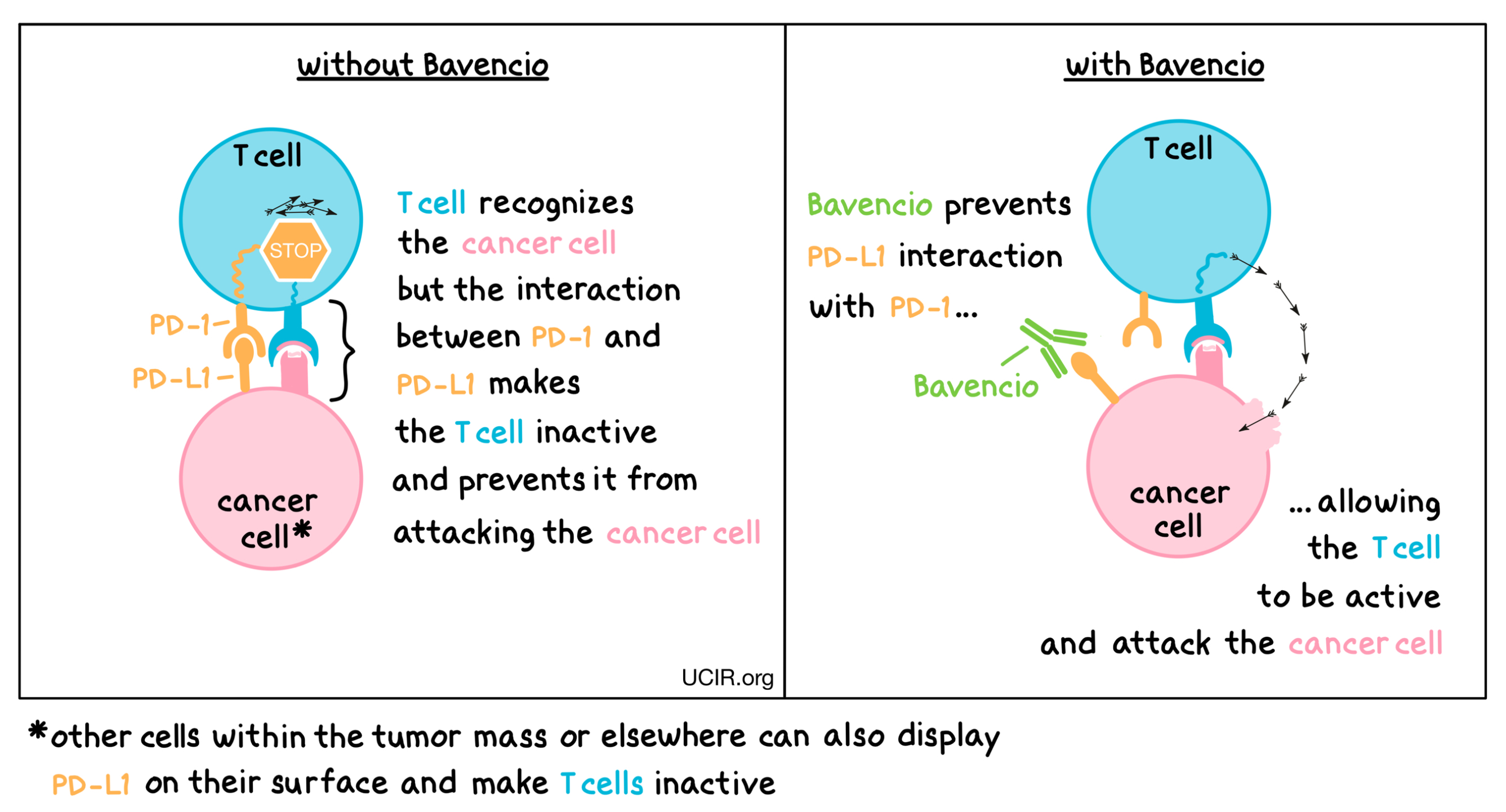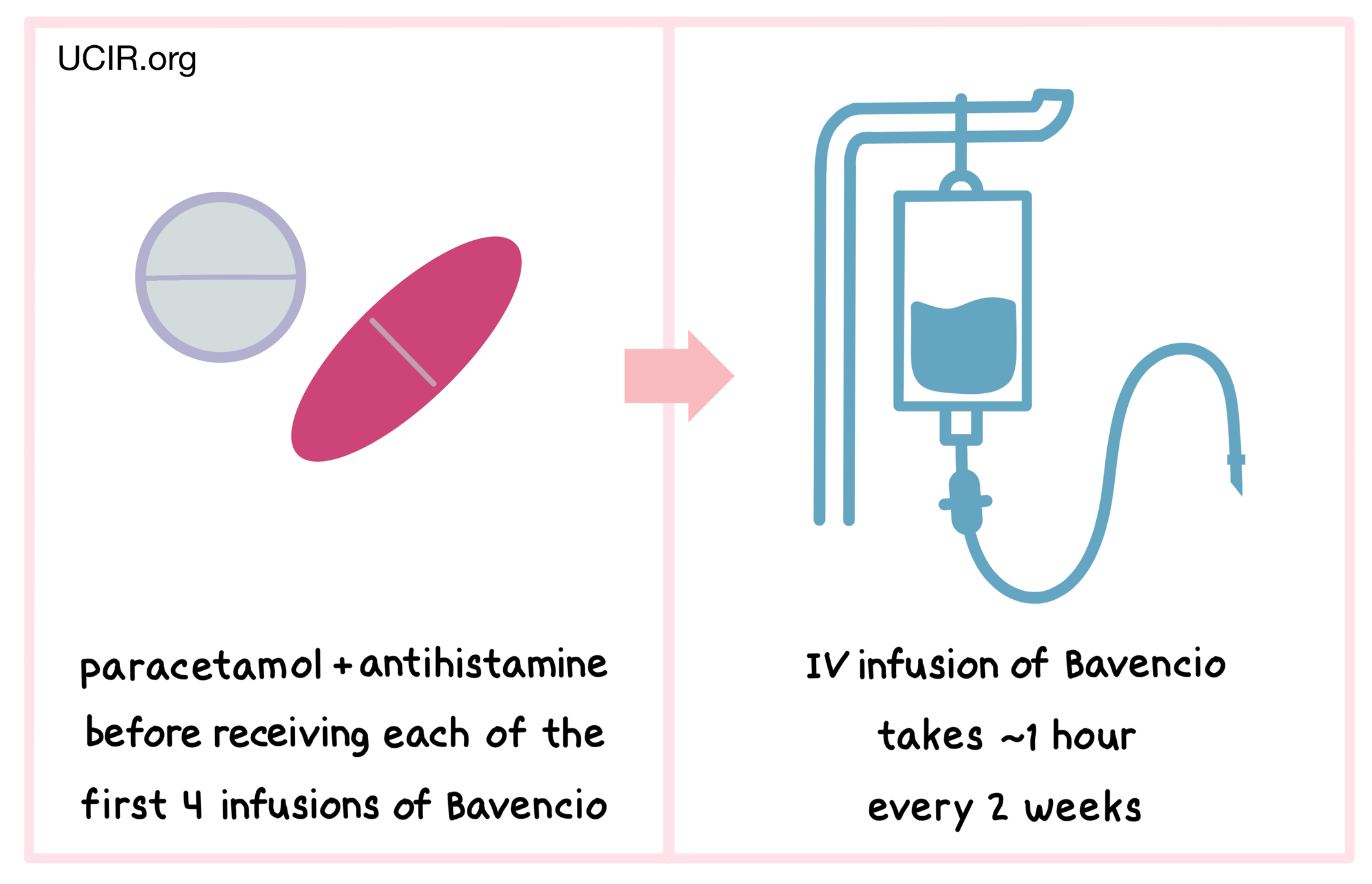How is this drug name pronounced?
Avelumab:a-VEL-yoo-mab
Bavencio: buh-VEN-see-oh
What cancer(s) does this drug treat?
Bavencio is approved for:
Merkel cell carcinoma
Bladder and urinary tract (urothelial cell) cancer
Kidney cancer
Advanced Merkel cell carcinoma
Bavencio is approved for:
- Adult and pediatric patients 12 years and older with Merkel cell carcinoma (a type of skin cancer) that is metastatic (cancer has spread to other parts of the body from the original cancer site).
Advanced bladder and urinary tract (urothelial cell) cancer
Bavencio is approved for:
-
Patients with advanced urothelial carcinoma (the most common type of bladder and urinary tract cancer) that has grown or spread and
- who have been treated with chemotherapy containing platinum, but it did not work or stopped working, OR
- who have been treated with chemotherapy containing platinum before or after surgery, but it did not work or stopped working within 12 months of therapy.
-
Patients with advanced urothelial carcinoma that has grown or spread and who have been successfully treated with chemotherapy containing platinum. In such cases, Bavencio is given as maintenance therapy to prevent the cancer from getting worse or coming back.
Advanced kidney cancer
Bavencio is approved for:
- Patients with renal cell carcinoma (kidney cancer) that has spread or cannot be removed by surgery. In such cases, Bavencio may be used in combination with axitinib (Inlyta)as a first treatment.
Limitations of use:
Age: The safety and efficacy of Bavencio in patients under 12 years of age with metastatic Merkel cell carcinoma have not been established. The safety and efficacy of Bavencio in patients under 18 years of age with all other cancer types approved for treatment with Bavencio have not been established.
Pregnancy/Breastfeeding: Bavencio can cause harm to a fetus and is not recommended for use during pregnancy. The risks associated with Bavencio during breastfeeding are not known and cannot be ruled out; due to the potential for serious adverse reactions in the breastfed child, women are advised not to breastfeed during treatment and for at least one month after the last dose of Bavencio.
Interactions with other drugs: The use of Bavencio with axitinib (Inlyta, Axinix) can increase the risk of damage to the liver or heart. Patients who are treated with Bavencio and axitinib have more frequent blood tests to monitor the function of their liver. Patients also undergo a thorough assessment of the condition of their heart before starting treatment, and have their hearts monitored regularly during treatment with Bavencio and axitinib.
Complications of stem cell transplant: Serious and life-threatening complications that can lead to death can occur in patients who have received a stem cell transplant from a stem cell donor before or after being treated with Bavencio.
Solid organ transplant rejection: Treatment with Bavencio can increase the risk of rejection in patients who have received an organ transplant.
What type of immunotherapy is this?
- PD-L1 blockade
How does this drug work?
- Target: PD-L1
Bavencio is an antibody that attaches to a molecule called PD-L1, which is sometimes present on the surface of cancer cells or other cells within the tumor mass. PD-L1 interacts with a molecule called PD-1, which is present on the surface of T cells – the primary immune cells involved in killing cancer cells. In healthy tissues, the interaction between PD-L1 and PD-1 puts on a brake that keeps T cells from creating an immune reaction that gets out of control. However, cancers can hijack this safety mechanism and prevent T cells from doing their job – killing the cancer cells. When PD-L1 interacts with PD-1 on T cells, the T cells become inactive and do not attack the cancer cells. Bavencio binds to the PD-L1 molecules on cancer cells and other cells within the tumor mass in such a way that blocks the interaction between PD-1 and PD-L1 and allows the T cells to be active and attack the cancer cells.
There may be other ways by which Bavencio helps destroy the cancer, and they are currently under investigation.

How is this drug given to the patient?
Prior to receiving each of the first four infusions of Bavencio (and prior to receiving subsequent infusions, if needed), patients receive acetaminophen and an antihistamine to reduce the chance of reactions to the infusion. Bavencio is administered via a tube into a vein (intravenous infusion, or I.V.) over 60 minutes. This occurs every two weeks and does not require a hospital stay.

What are the observed clinical results?
For:
Advanced Merkel cell carcinoma
Advanced bladder and urinary tract (urothelial cell) cancer
Advanced bladder and urinary tract (urothelial cell) cancer (maintenance therapy)
Advanced kidney cancer
It is important to keep in mind that each patient’s actual outcome is individual and may be different from the results found in the clinical studies. In addition, with immunotherapy, sometimes it takes several months for responses to be observed.
Advanced Merkel cell carcinoma
In a clinical trial, 88 patients with Merkel cell carcinoma that had spread and did not respond to or stopped responding to chemotherapy, were treated with Bavencio. At a minimum follow-up of 36 months, 33% of patients responded to treatment, including 11% whose tumors disappeared completely and 22% whose tumors shrank. Among the patients who responded to Bavencio, 90% continued to respond for 6 months or longer, and 66% continued to respond for 12 months or longer. The median duration of response was 41 months.
Additionally, 116 patients with Merkel cell carcinoma who had not received any prior treatments were treated with Bavencio. 40% of these patients responded to treatment, including 16% whose tumors disappeared completely and 23% whose tumors shrank. Among the patients who responded to Bavencio, 76% continued to respond for at least 6 months, and 52% continued to respond for at least 12 months. The median duration of response was 410 months.
Advanced bladder and urinary tract (urothelial cell) cancer
In a clinical trial of patients with advanced urothelial carcinoma that had grown or spread and who had been treated with chemotherapy containing platinum, and it did not work or stopped working, at a minimum follow-up for 6 months, 16% of patients treated with Bavencio responded to treatment, including 6% whose tumors disappeared completely and 11% whose tumors shrank. Among the patients who responded to Bavencio, 85% continued to respond for 6 months or longer, and 15% continued to respond for 12 months or longer. Responses lasted from 1 month to more than 17 months.
Advanced bladder and urinary tract (urothelial cell) cancer (maintenance therapy)
In a clinical trial of 700 patients with advanced urothelial carcinoma that could not be removed by surgery and had grown or spread, and who had been successfully treated with chemotherapy containing platinum, patients were treated with either Bavencio plus best supportive care, or best supportive care alone within 4-10 weeks after the last chemotherapy dose. Patients treated with Bavencio plus best supportive care lived for a median of 24 months. Patients treated with best supportive care alone lived for a median of 15 months.
Advanced kidney cancer
In a clinical trial of patients with previously untreated renal cell carcinoma (kidney cancer) that had spread, patients were treated with either Bavencio +axitinib (Inlyta) or with sunitinib (Sutent). Among the patients treated with Bavencio + Inlyta, 53% responded to treatment, including 4% whose tumors disappeared completely and 49% whose tumors shrank. In comparison, 27% of patients treated with Sutent responded to treatment, including 2% whose tumors disappeared completely and 25% whose tumors shrank. Patients treated with Bavencio + Inlyta experienced no disease worsening for a median of 13 months, while patients treated with Sutent experienced no disease worsening for a median of 8 months.
What are the side effects?
The most common side effects of Bavencio include fatigue, pain (in the muscles, bones, head, stomach area, and back), constipation,diarrhea, nausea, vomiting, decreased appetite, weight loss, redness, rash, chills, fever, urinary tract infection, high blood pressure, swelling in the hands, feet, or ankles, inflammation of the lining of the digestive tract, difficulty speaking, cough, and low red blood cell count.
Bavencio can cause the patient’s T cells to attack healthy cells throughout the body. Because of this, Bavencio can cause side effects that can become serious or life-threatening, and may lead to death. Some of the serious side effects related to Bavencio include inflammation of the lungs, liver, kidneys (which can lead to kidney failure), or colon (which can result in tears or holes in the intestine). Additionally, problems can arise with the heart and hormone glands (including thyroid, pituitary, and adrenal glands, as well as the pancreas). Bavencio can cause Type 1 diabetes. Skin rash and reactions related to the infusion may also occur.
Patients should report any symptoms to their healthcare provider, who can then initiate actions to limit or reverse the side effects.For a more complete list of possible side effects, see the full prescribing information.
Additional information
Manufacturer
EMD Serono
Approval
FDA and EMA
Links to drug websites
- US: https://www.bavencio.com/patients-and-caregivers
- Europe: https://www.ema.europa.eu/en/medicines/human/EPAR/bavencio
Last updated March 15, 2024




